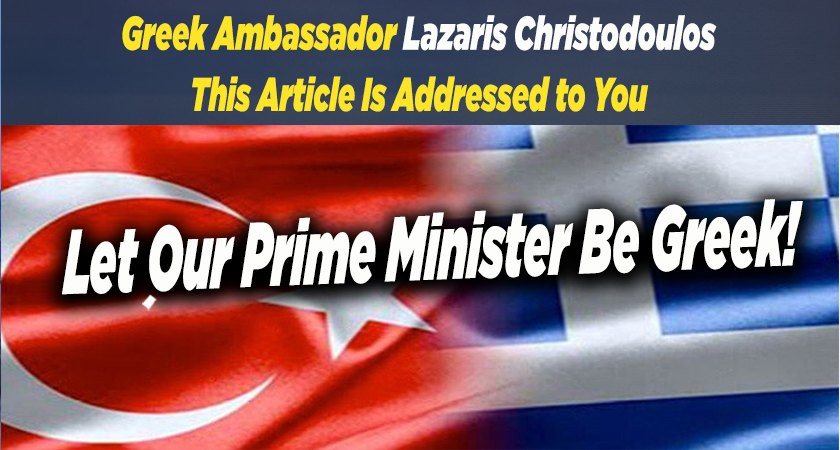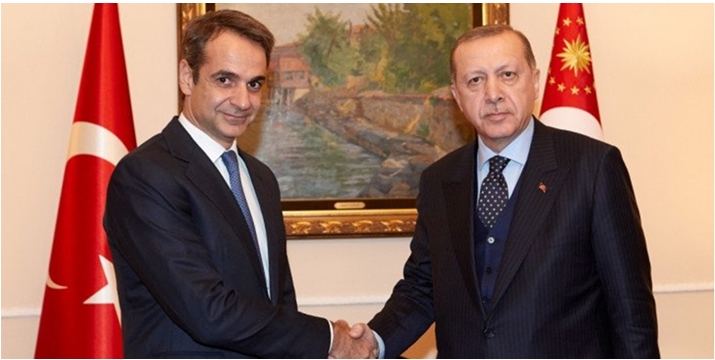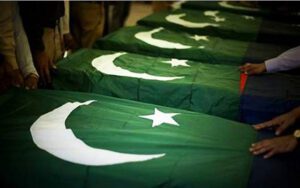
Upcoming Turkish Greek War
Upcoming Turkish-Greek War
Greek Ambassador Lazaris Christodoulos This Article Is Addressed to You
Let Our Prime Minister Be Greek!
Osman Başıbüyük, Sun Defense Net, 03 July 2022
Source: Greek Reporter
In recent days, there has been serious tension between Turkey and Greece. Someone wants to drag these two countries into war. We are facing a situation similar to the Ukraine-Russia War. It seems as if the addition of new wars to the Ukraine-Russia war, which was picked out within the framework of the “Great Reset” plan of the Global Financial Cult (Global Capital), is necessary. One of the potential point of conflicts is the Sino-Taiwan issue, while the other is the conflict of interest between Turkey and Greece in the Eastern Mediterranean. An outbreak of war between these two countries will destroy both of them. As always, because those who set the trap always use the same model, we need some knowledge of history to get out of the trap.
Knowing how and the reasons behind why Greece was extorted from the Ottoman Empire from both perspectives will enable us to understand the problem and find a solution.
The Ancient Greek Model
Between 756 and 146 BC, a Greek civilization lived on the lands of today’s Greece and Anatolia. In this period, every island, every valley and plain and every seaside port had small self-governing units. We can call this system the “City States Model” governed by democracy.
City-states in Greek civilization were always in competition with each other, and sometimes even fought against each other. The reason was, when governance (power) was divided, due to economic competition, people led by different political authorities could become hostile towards each other, even if they came from the same ethnic and religious background. This rivalry and conflict made small city-states vulnerable to outside forces. They struggled to unite even against their arch-nemesis, the Persians, and some were in cahoots with the Persians in their struggle for supremacy over each other.
City-States were very vulnerable to outside forces. After a while, due to this weakness, the City-States Model collapsed and was erased from the scene of history. This model was replaced by empires. Empires enabled peoples of different ethnic and religious structures to coexist peacefully under a single governing authority. The Roman, Byzantine and Ottoman Empires following the ancient period performed this function.
Now let’s fast forward history a bit. The United States, made up of British, French, Dutch and Spanish colonies, declared its independence on July 4, 1776. Some of the important capitalists of the Global Financial Cult started to settle in the USA after the discovery of the continent. When the USA got rid of its colonial status, the capitalist had then got rid of the kings that were previously in authority. There was no king in Washington either. Capital wants to be free. A similar situation could have happened in Europe. The capitalist bourgeoisie in France, influenced by the USA’s war of independence, had started the French revolution. The aim was to overthrow the absolute monarchy, the establishment of a republic, and the reduction of the Catholic Church’s power through serious reforms. The Revolution, which started in 1789, ended with the proclamation of the republic in 1792. The French Revolution fueled nationalist movements all over the world.
Now let’s examine the issue from a monetary perspective. Global Financial Cult as befits the name, does not have a homeland. For example, the Rothschild family had collaborative banks in England, Germany, France, Italy and Austria-Hungary at that time. Similar financial ties were established with the USA. State-controlled finance, now independent of states, began to globalize in the hands of bankers. After the Battle of Waterloo, which took place between France and England in 1815, the Rothschild family had control of the entire banking and financial system of England and France. The family, which acquired great fame after that date, began to lend to many states.
The big bankers were getting the largest portion of their income from the loans they gave to the states. The main reason for debt acquired by the states was the wars that they waged with each other. Another important source of income for the bankers came from their insurance and financing of international trade.
In order for the globalizing capital, in other words the Global Financial Cult, to move freely, kingdoms had to be destroyed and republics had to be established in their place. At the same time, wars were needed to raise money. For this purpose, the disintegration of empires was planned. The Ancient Greek Model, in other words the city-states, was the indeed the inspiration behind this idea. If each ethnic group had a state of its own, empires would crumble. In this scenario, the Global Financial Cult would not only make a lot of money from wars but also it would get rid of kings who had absolute authority. The weakest link was the Ottomans, and hence the Global Financial Cult launched forth the plan from there.
Greek War of Independence
While Greece was under the control of the Ottoman Empire, thanks to the islands in the Mediterranean, Aegean and the ports on the Greek mainland, the Ottomans earned a significant amount of income by controlling the trade of all of the Balkans, Eastern Europe, the Eastern Mediterranean and Russia. The independence of Greece would cause constant conflict and reduce the share of both states in regional trade. Removing this income from the Ottoman Empire and transferring it to the Global Financial Cult would pave the way for the disintegration of the empire. This situation also suited the powers such as England, France and Russia competing in the region. The Greek War of Independence was plotted for this purpose.
Now let’s try to understand the intellectual groundwork of the war. The pioneer of the Greek war of independence was Belgrade-born Rigas Velestinlis (1757-1798). Rigas was influenced by the French revolution and thought that a similar revolution could take place in the Ottoman Empire. Rigas dreamt of establishing an order in the Ottoman Empire where all nations, Hellenes, Albanians, Vlachs, Armenians and Turks would live together indiscriminate of religion and language, and no nation would have hegemony over another nation. Rigas’ apparent intention was to establish a Balkan-Anatolian Confederation.
Rigas works for this purpose, first preparing a map of Wallachia and Moldavia, and then of Hellas. The map of Hellas covers a wide area from the Danube to Crete, from the Adriatic Sea to the middle of Anatolia. The ancient ethnic name of each region, important events during the ancient Greek civilization, and famous people are indicated on the map. In fact, Rigas in his maps was actually shows possible regions where small states could be established.
Rigas prepares a constitution and a declaration of human rights.[1] He provokes uprisings by conferring with Greek Orthodox bishops and guerrilla leaders, proposing that the Ottoman Christian subjects have the right to self-determination. On his way to Corfu Island, the center of Greek freemasonry, to meet with Napoleon in order to get support for the rebellion, he was captured by the Austrians, handed over to the Ottomans and executed in Belgrade in 1798. Rigas’ dreams were left unfinished. Rigas was a freemason and had helped find lodges in Bucharest, Budapest, Belgrade and possibly Semlin (today Zemun).[2]
Freemasons and the Greek War of Independence
Freemasons played a very important role in the Greek War of Independence. For example, the secret organization Philiki Etaireia, which was established to ensure the independence of Greece by breaking it off from the Ottoman domination, is a masonic organization. It was established on September 14, 1814 in Odessa, Ukraine, as a sub-branch of the Moscow Lodge. One of its founders, Nikolaos Skoufas, became a Freemason on the island of Corfu. The leaders of the organization and a significant part of its members are freemasons.[3]
Corfu Island is an island where Greeks, Catholics and Jews who fled the Inquisition in the Middle Ages lived together. The island is also the first piece of land that the Russians took over in the Mediterranean (1799). Since the island changed hands between the French, British and Russians, the leading freemasons of the island were included in the masonic organizations in all three countries.[4] It is probably freemasons of Corfu origin who were influential in the masonic organizations of all three countries that later enabled these three countries to support the Greek War of Independence. We will explain in the following.
In the same period, the secret organization Carbonari was established to separate Italy from the Austro-Hungarian Empire.[5] The initiation rituals and secrecy-based organizational structures of the Carbonari and Philiki Etaireia are very similar to those of Freemasonry. Later, the model would repeat itself with the establishment of the organization of Union and Progress in the Ottoman Empire (İttihat ve Terakki Cemiyeti). Because it is not possible to send people to war without enticing feelings of nationalism, all these organizations were founded on a deep nationalism as if they were founded by the same secret mind.
During this period, Hellenistic Committees were established all over Europe. The aim was to instill the idea of the Ancient Greek Model, that is, city-states governed by democracy, to the people. According to this idea, with the right to self-determination, every ethnic group should govern itself through democracy. This is why the story of ancient Greek culture laying the foundations of Western Civilization was created.
The biggest supporters of the Hellenistic Committees are the Masonic lodges in Europe. Masonic lodges, of which notables in England, France and Germany were members to, were not directly involved in politics until the 1850s, but only engaged in charity work. The only exception was that all of these lodges supported the Greek Independence Movement.[6] Maybe its members were not aware of it, but the main purpose was to disintegrate the Ottoman Empire by implementing the “City States Model” of Ancient Greece. Many lodges participated in fundraising campaigns in favor of the rebellious Greeks. Even among those who landed after the Battle of Navarino were German, Dutch, French, and Swiss Freemasons who had come to fight to help the Greeks.[7]
Now let’s talk about some symbol heroes so that you have a better understanding of who organized the Greek War of Independence.
Symbol Heroes of the Revolt
Lord Byron
The famous poet Englishman Lord Byron had agreed in April 1823 to act as agent of the London Committee, which was set up to aid the Greeks in their struggle for independence. Byron was living in Italy at the time. He was a very flirtatious character; He was forced to leave England when his bisexual relationships and his relationship with his father’s first wife’s daughter, Augusta, came to light. He became a member of the Carbonari organization in Italy. Lord Byron went to war in Greece in 1823. He assumed personal command of a brigade of Souliot soldiers who were said to be the bravest of the Greeks. He fell ill in February 1824 and died in Greece.[8] Lord Byron is the author of Hebrew Melodies, consisting of 30 poems. These poems were composed by Isaac Nathan and were later transformed into songs. Nathan, a Jew of Polish descent, claimed that these melodies were sung in the destroyed temple in Jerusalem a thousand years ago. Byron’s works were used to construct a new Jewish identity at that time.
Lord Byron is friends with the poet and writer Isaac Disraeli. Benjamin Disraeli, son of Isaac Disraeli, became Britain’s first Jewish Prime Minister.[9] Benjamin Disraeli is a close friend of England’s most powerful man, Lionel de Rothschild. At the same time, this whole group of people are Freemasons.
Adamantios Korais
Another symbolic name of the war of independence is Adamantios Korais. A linguist living in France, born in Izmir, Korais, who pioneered the development of the modern Greek literary language, is one of the advocates of the Ancient Greek Model. He supported the Greek War of Independence. During the war, he corresponded with American President Thomas Jefferson, exchanging ideas on the concepts of democracy and freedom. Jefferson is a Greek-speaking president who admires ancient Greek culture and supports the war of independence.
Count Ioannis Antonios Kapodistrias
Ioannis Kapodistrias is considered the founder of the modern Greek state and the architect of Greek independence. After a long and distinguished career in European politics and diplomacy, he was elected as the first head of state of independent Greece.[10] Kapodistrias was born on the island of Corfu to a distinguished family of Venetian origin. Many Italian Jews living in Venice during the Inquisition took refuge on the island of Corfu. Kapodistrias studied medicine, philosophy and law at the University of Padua between 1795-97. When Corfu was briefly occupied by Russian and Ottoman forces in 1799, Kapodistrias served as the head doctor of the military hospital. After a while, Kapodistrias entered the service of the Russian ambassador in Italy, and thanks to him, he started to work in Russian foreign affairs. Due to his achievements, he was made Russian Foreign Minister by the Russian Tsar Alexander I in 1813.
When the Greek revolt was successful in the Peloponnese, and Navpoli became the first capital of Greece, Kapodistrais was elected as the first head of state.[11] After a while, states such as England, France and Russia, which were ruled by the kingdom, were disturbed by the state system that was transforming into republicanism in Greece. In 1831 Kapodistrais was assassinated. Otto, the Prince of Bavaria, was appointed as king.
Ioannis Kapodistrias is a member of the Philiki Etaireia organization. Although he was the founding leader of the masonic lodge called Phoenix, which was established in Moscow in 1811, he also worked in another lodge called Modestie in Zurich.[12]
Panayiotis Panas
Panayiotis Panas was one of the pioneers of the revolt in 1856 to liberate the Thessaly region, the north of Athens, from Ottoman rule. Although the uprising was suppressed at first, the Thessaly region joined the newly established Greek state.
Panas founded the Democratic Eastern Federation (DEF) or Rigas Association, a secret organization based in Athens, in 1868. The aim of Panas is to realize the dream of Rigas Velestinlis, who was executed by the Ottomans in 1798, the Balkan-Anatolian Confederation. The Democratic Eastern Federation (DEF) would fight against the “tyrant rule of the Sultan” and by taking the Sultan down, it would establish separate republics where people from all ethnic and religious groups would live in equality and justice.[13] This dream came to life only after the First World War.
Panas also supported the popular uprising of 1848, which had resulted in the overthrow of the King of France.[14] At that time, there was a famine due to the potato disease. Karl Marx and Friedrich Engels provoked the people to take to the streets with the Communist Manifesto, and thus, the change of regime was realized.[15]
The secret Democratic East Federation Organization, founded by Panas, also has branches in other cities such as Bucharest and Istanbul. The Istanbul Branch was probably managed by the Grand Vizier Mithat Pasha (1876).[16] The New Ottomans Society, headed by Mithat Pasha, is most likely the visible face of the secret organization. Already in 1876, while the first and last constitution of the Ottoman Empire, Kanun-ı Esâsî was being prepared, it was claimed that Mithat Pasha had designed a republican regime. It is said that the Organization of the Democratic East Federation was also supported by Prince Halim Pasha, son of Muhammad Ali, the first Khedive of Egypt.[17] Panas, had lived in Egypt for a long time. The Balkan-Anatolian Confederation, which would be established according to his wishes, would also include Egypt.[18]
Panayiotis Panas was born on the island of Kefalonia, south of the island of Corfu. His ancestors were Jews who fled the Spanish Inquisition and settled first in Venice and then on the island of Kefalonia. Josep Naci, who escaped from the Portuguese inquisition at the same time as Panas’ ancestors, came to Istanbul. It is noteworthy that Sultan II. Selim gave the title of Duke of Naxoz in 1566 to Naci.[19] The duchy was founded on the Cyclades Islands in the Aegean Sea, with Naxos as its center.
Conclusion
As can be understood from the ethnic identities of the heroes of the Greek War of Independence, there is a secret structure that provokes the rebellion and directs the war. This structure is undoubtedly linked to the Global Financial Cult. The Global Financial Cult had established cryptic organizations, generally settled in masonic lodges and used members for their own interests.
After the 1815 War of Waterloo, the two great powers of Europe, England and France, were both very worn out and economically condemned to the Global Financial Cult. Germany could not achieve its unity at the time. Taking advantage of this gap, with the project of giving each ethnic community its own state, based on the Ancient Greek Model, the Global Financial Cult decided to establish republics that it would have control over more easily, through destroying kingdoms and breaking up empires. History was not left to its natural course, but was desired to be changed in line with the interests of a few families at the top. In words with today’s discourse, a Big Reset was planned at that time as well. The aim was to return to the ancient Greek model, namely the city-states model, that lived and failed BC. Thus, the Global Financial Cult being an external power against the new small states would benefit from conflicts between them. The same effort still continues today. States are tried to be downsized as much as possible. The first victims of this plan were those who had started the revolt in 1821, Greece and the Ottoman Empire.
When the independence of Greece was recognized in 1832 and Prince Otto of Bavaria was enthroned as King, the country was in a state of ruin. While they were fighting with the Ottomans, they were also fighting among themselves. At least 70% of the tax they collected went to military spending. Since then, the very limited financial means made the Greeks dependent on foreign aid.[20] The reason for the overthrow of King Otto was economic. Since then, no leader has been able to fix the Greek economy.
From March 17, 1821, when the Greeks started the revolt, until September 9, 1922, when they were cast into the sea in Izmir, they fought the Turks in short intervals for exactly 101 years. What for was this constant conflict?
Those lands were theirs anyway, no one was kicking them out of their lands. The only reason for the war was a desire for change regarding the way in which the Greek were governed. The Ottoman Governor had left but was replaced by the Bavarian King Otto. So, what was it that had actually changed?
This war waged for the purpose of changing the form of government had brought nothing but blood, tears and debt burden on both sides. The only winner of the war was the Global Financial Cult.
Now they are telling Turkey and Greece to, “FIGHT ONCE MORE”!
ARE WE IDIOTS THAT WOULD WAGE A WAR AGAIN?
WHO WILL BE THE WINNER OF THIS WAR?
Let’s say that Greece increased its territorial waters to 12 nautical miles in the Aegean, fought with Turkey and won. What will happen? Greece has the third highest GDP-to-debt ratio in the world (210%). In a possible war, there will be serious loss of life, property and infrastructure. The share that the Global Financial Cult will give to Greece from the Eastern Mediterranean energy resources will not be enough to compensate the families for the people they would lose during such a war. What’s more is that rebuilding the country is impossible. The case of Ukraine is manifest. The Global Financial Cult never give any country enough money to escape from the debt trap.
Today, a trap is being set against Turkey and Greece. Watch out for the ultra-nationalist, shouting, heroic men in both countries! Similar to the historical events described above, some of them are cryptos that are preparing the people of the two countries for war.
Let’s break this trap
It is time to throw away the failed Ancient Greek Model of BC. We should unite instead of disintegrating due to wars.
In history, the Ottoman Empire had many Grand Viziers, Viziers and Pashas of Greek origin. Let it be the same today, let the prime minister be from you and the president from us!
Strategic cooperation between Turkey and Greece is the only way out for both countries. Greece lost its independence by becoming a member of the EU. Greece should observe ancient Greece; their direction is always Anatolia, not the West. As they turn to the West, they surrender, and that has indeed been the case. If it is the case that they return to the east, they will certainly be prosperous.
Turkey’s strategic cooperation with Greece is much more valuable than its cooperation with Russia or China. Remember, the Ottoman Empire is a Balkan state. Together with Greece, we can dominate the Eastern Mediterranean from the Balkans to the Middle East, from Malta to Cyprus. In this region, the USA, England, France and Russia have always used Turkey and Greece against each other in their struggle for dominance. A cooperation between Turkey and Greece disables all actors, including Germany. That’s when the main actor, the Global Financial Cult will give both of us what we deserve.
If I were the Minister of Defense, Hulusi Akar, I would go on television and would tell the people; “I am giving the Istanbul Hasdal Barrack to the Greeks, they should bring and put an armored brigade here.” Even the deputy commander of the Aegean Army should be Greek!
Let’s address the Turkish public opinion here. Don’t be afraid! Megali Idea is over, it has already become a fairy tale. In 2003, the US could not hold on to the Sunni region of Iraq. Today Russia besieged Kiev; and drew a blank. It is nothing but a dream for Greece to take Istanbul with a population of 10.7 million. Two million refugees occupying Istanbul could not be effective, will five thousand Greek soldiers conquer Istanbul? Believe me, even starting this utopian discussion will prevent the conspired Turkish-Greek war.
The best way to prevent war is to reach out to the people on the other side. If Greek peoples see the truth, no one, including Mitsotakis (possible crypto), can drag them into a pointless war.
Peace at home, peace in the world…
[1] Kathleen Ann O’Donnell, “The Disintegration of the Democratic Eastern Federation and the Demise of its Supporters 1885- 1896 and the Poems of Ossian”, Athens Journal of Mediterranean Studies- Volume 2, Issue 2 – Pages 145-160
[2] Bernard Ducret and Alexis Krauss, “Freemasonry and the foundation of Greece”, https://www.academia.edu/49394816/Freemasonry_and_the_foundation_of_Greece
[3] Ibid.
[4] Ibid.
[5] https://www.britannica.com/biography/Lord-Byron-poet
[6] Bernard Ducret and Alexis Krauss, “Freemasonry and the foundation of Greece”, https://www.academia.edu/49394816/Freemasonry_and_the_foundation_of_Greece
[7] Bernard Ducret and Alexis Krauss, “Freemasonry and the foundation of Greece”, https://www.academia.edu/49394816/Freemasonry_and_the_foundation_of_Greece
[8] https://www.britannica.com/biography/Lord-Byron-poet
[9] https://www.jstor.org/stable/20775391 https://victorianweb.org/previctorian/disraeli/intro.html https://publicdomainreview.org/essay/the-curious-world-of-isaac -disraeli
[10] https://en.wikipedia.org/wiki/Ioannis_Kapodistrias
[11] Kathleen Ann O’Donnell, British School at Athens, Greece, “Nineteenth-Century Cycladic Warriors: Celtic Heroes”
[12] Nicholas Michael Rimikis, “Filiki Etaireia: The rise of a secret society in the making of the Greek revolution”, Spring 2017, Bard College
[13] Kathleen Ann O’Donnell, “The Disintegration of the Democratic Eastern Federation and the Demise of its Supporters 1885- 1896 and the Poems of Ossian”, Athens Journal of Mediterranean Studies- Volume 2, Issue 2 – Pages 145-160
[14] Ibid.
[15] Osman Başıbüyük, “The Three Agents of Stateless Money Marx, Engels, Lenin The Expropriation-Enslavement Game from Past to Present”, 28 April 2022









